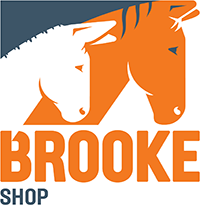More ways your gifts are helping
On the streets of Lahore
Sixty-year-old Saira lives in a rubbish-collecting community in Lahore, Pakistan. She has a four-year-old cart donkey called Choha. Every day Choha takes Saira and her husband to collect rubbish around Lahore and bring it back for sorting.
Saira takes pride in keeping Choha well groomed and in good condition. But Choha’s work takes him through the busy streets of Lahore where he often gets puncture wounds in the soles of his feet from sharp objects such as nails that litter the road. Without proper treatment, these wounds can become infected, causing pain and lameness.
Saira is part of a women-only donkey welfare group facilitated by Brooke and led by Brooke Pakistan’s only female vet, Dr Sabira Nazir. Dr Sabira and her team visit the group every other week and lead community engagement sessions on animal welfare.
Before Brooke worked with this community, Saira did not know how to treat Choha’s wounds so he often became lame. “Before, I would put battery acid on the foot if it had a wound. Now I know to remove whatever is in his foot and put iodine on it, bandage it and make sure he is rested.
“I realise now that if I feel pain, so does my donkey, so we need to manage it properly. Without Choha, I could not earn any money. We are not educated people but we have to live with our circumstances, and the donkeys help a great deal.”
Help us improve the lives of more hardworking horses, donkeys and mules

Saira, Choha and Dr Sabira
The importance of shelter
Fane Ndaw is an eight-year old mare living in the village of Mboul Ndiogone near Sokone in Senegal. Her owner, Diene Sene, is a carpenter who also earns money growing maize, millet and peanuts. Like many mares in Senegal, Fane Ndaw is used for farming work for two months of the year and the rest of the time she is used for breeding. During this time, many mares are left to roam and fend for themselves, and so are at risk of malnutrition, parasites, overgrown hooves and injuries.
Since Brooke’s community relay has been working in Diene’s village, he has learnt the importance of having a shelter for Fane Ndaw: “I don’t allow her to roam, I’ve built a shelter for her next to my house and that’s where she stays all year.
“Having my horse in a shelter means I can now pick up the hoof and clean it out every day. I learnt this from the relay and also heard it on the radio.”
As well as giving animal owners the skills and knowledge to help better care for their animals, Brooke also encourages an attitude change in how owners see their horses.
Diene says: “I now better understand my animal and am more interested in her welfare.
“I have more attachment... I see her in the morning when I feed her and check on her last thing at night before I sleep.”
Help us reach more communities
Dispelling myths in Senegal
Fourteen-year-old Babacar and his brother care for the family’s mare and stallion. Both horses are used in agriculture and the stallion is also used for transportation.
When the mare was pregnant, her hooves became so badly overgrown that she was having trouble walking. Eventually Babacar took her to see Brooke-trained farrier Omar Fane at Sokone Market to have her hooves trimmed. He noticed that, in contrast, the stallion’s hooves were trimmed and healthy, and Babacar said that his father hadn’t allowed him to take the mare to the farrier sooner because she’s pregnant.
Omar explained: “There is a traditional and popular misconception in Senegal that if you touch the frog [part of the hoof] of a pregnant horse, she will abort her foal”.
Recently the mare had been taken ill with colic and needed veterinary treatment. While treating her, the vet explained to Babacar’s father that this widely held belief was false, and that his horse was in pain and discomfort due to her overgrown hooves. “The vet compelled my father to seek a farrier and that is why I am here today” said Babacar
Brooke, through our partner UGAN, trains local service providers, including veterinary professionals and farriers. We encourage them to connect with each other so they can extend their networks. In this case, it meant that a trusted veterinary professional was able to advise an owner to go to a farrier and improve the welfare of his mare.

